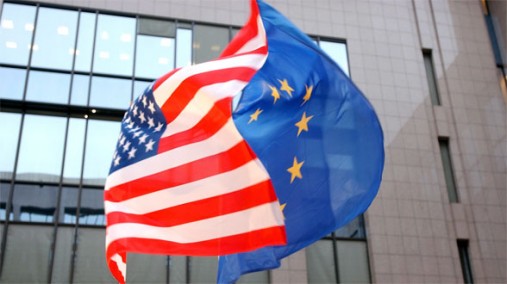As the presidential election reaches the home stretch, the Obama and Romney campaigns have made clear their single-minded focus: fixing the economy. But to achieve that goal, the next president must take seriously the pressing need for a full free-trade agreement between the United States and the European Union.
President Obama recognizes that Europe’s economic troubles have a “significant impact” on our own economy. “As our largest trading partner,” he explained at the G20 summit in June, “slower growth in Europe means slower growth in American jobs. So we have a profound interest in seeing Europe prosper.”
But while the president offered rhetoric, he refused to follow his words with actual deeds. “The challenges facing Europe will not be solved by the G20 or by the United States,” he said in the same speech. I suppose that this is what his advisers meant when they said that he would “lead from behind.”
No one is asking the U.S., or the G20, to solve all of Europe’s problems — obviously not. We can’t “save” Europe. But the U.S. certainly can do a lot to help Europe help itself, as we did after World War II. First and foremost, we can work together to develop a long-needed U.S.-EU free trade pact.
Unfortunately, this administration treats the free-trade goal not as the key to job growth, but as a distraction from it. “With so many jobs at stake right now,” the U.S. trade representative warned earlier this year, “neither the U.S. nor the EU can afford to leap into open-ended negotiations on faith alone.” That has it upside down. With so many jobs at stake, this is precisely the time when Americans and Europeans need to be most open to the benefits of transatlantic trade in order to create jobs.
To his credit, Mitt Romney has been much more open to the need for these reforms. In addition to his general call for a “Reagan Economic Zone” creating a multinational open market, he has focused specifically on Europe, noting that “a united Europe is a natural partner for such a venture, and the benefits would be large: perhaps approaching $200 billion in GDP growth for the United States and Europe combined.”
And then there is also Russia. Vladimir Putin’s political muscle continues to be his nation’s energy resources, which long have been a dominant weapon backing Russia’s leverage over Europe, especially among the EU’s eastern members.
Europe has attempted to push back against Russia, first and foremost through a European Commission antitrust investigation against Gazprom, the Russia pipeline giant. But a transatlantic trade agreement, coupled with our own rapid expansion of domestic gas supplies, poses an even more direct threat to Russian power. Under U.S. law, the establishment of a U.S.-EU trade pact providing for “national treatment for trade in natural gas” would automatically fast-track the domestic regulatory process for low-cost liquefied natural gas exports to Europe, which could dramatically alter the balance of economic power and ignite job growth in both continents.
European nations already are taking steps toward trade liberalization, following Germany’s example. Not even a decade ago, Germany was the “sick man of Europe”; but once it reformed its regulations governing labor and other economic issues, Germany’s economy jumped into action almost overnight. Spain is the latest to follow suit, promising to eliminate “overlapping regulations set by different levels of government, further loosening of rigid labor laws and placing limits on early retirement,” according to The Wall Street Journal. That is a welcome start, and other nations should follow suit. But we can help them move faster with transatlantic regulatory harmonization and a trade pact.
Four years ago, the president called for a new Marshall Plan at home and abroad. He evidently forgot that the first Marshall Plan restored Europe’s economy after World War II, and thus preserved ours. Like the old plan, the new Marshall Plan should begin with our relationship with Europe.
C. Boyden Gray, a member of the Atlantic Council Board of Directors, is a former US ambassador to the European Union. This essay was published by the Washington Times.
Image: us-eu-flags-intertwined.jpg
